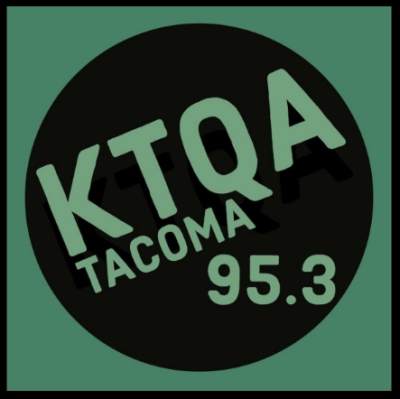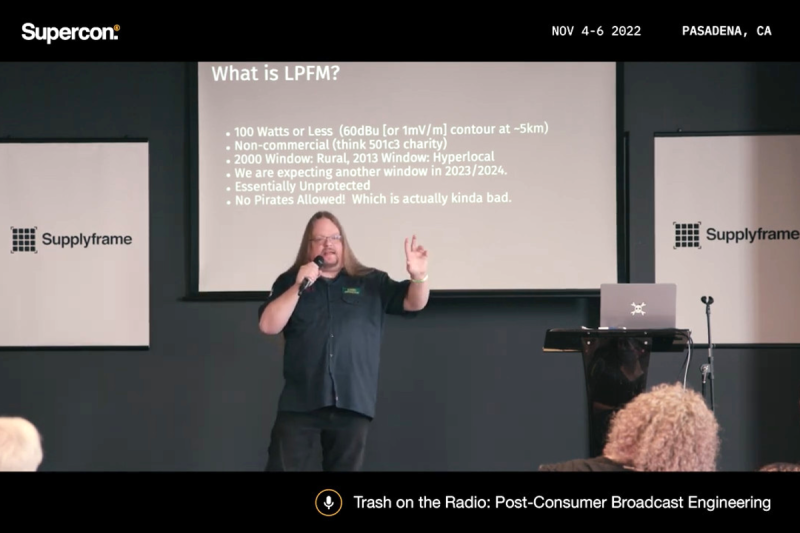Sam Mulvey built his own radio station in Tacoma, WA. Is there a better way to meld ham radio practice with a colossal number of DIY electrical and computer projects? Sam would say there isn’t one! This 45-minute talk is basically the lessons-learned review of setting up KTQA 95.3 – the radio station on the hill.
Sam starts out the talk by introducing you to LPFM. And maybe you didn’t know that there’s a special type of license issued by the US FCC allowing non-profit community radio stations up to 100 W, covering an radius of around 5 km. It’s like running a pirate radio station, but by jumping through a few legal hoops, made legal.
Trash on the Radio
Putting a radio station together on a budget requires a ton of clever choices, flexibility, and above all, luck. But if you’re willing to repair a busted CD player or turntable, scrounge up some used computers, and work on your own amplifiers, the budget doesn’t have to be the limiting factor.
Being cheap means a lot of DIY. For instance, Sam and friends made a custom console to support all the gear and hide all the wiring. Some hot tips from the physical build-out: painted cinderblocks make great studio monitor stands, and Cat-5 can carry two channels of balanced audio along with power, with sufficient isolation that it all sounds clean.
But not everything in the KTQA studio is cheap. Sam spends the money when it counts, and first splurge was quality microphones. And thanks to the rise of podcasting and streaming, items that used to be clear DIY choices like microphone stands and sound dampening material are now into Sam’s buy-vs-build category.
Open Source on the Airwaves
 Sam then goes through all of the software that runs the station. Perhaps not apparent to those outside the scene, the Linux audio ecology has grown up enough that it can meet the needs of the professional studio. All the usual suspects are here, from Jack to Audacity and ffmpeg. Using an open production toolchain allows Sam to write some of his own tools too, and that includes a studio automation tool, VU meters over websockets, and a dead-air detector.
Sam then goes through all of the software that runs the station. Perhaps not apparent to those outside the scene, the Linux audio ecology has grown up enough that it can meet the needs of the professional studio. All the usual suspects are here, from Jack to Audacity and ffmpeg. Using an open production toolchain allows Sam to write some of his own tools too, and that includes a studio automation tool, VU meters over websockets, and a dead-air detector.
SDR tools are in abundance for monitoring their local output for making sure they’re not overmodulating or stomping on other nearby signals. But Sam is also planning to do a live comparison of their coverage when running in stereo vs mono by “FM Wardriving” around Tacoma to see which comes in best.
Finally, Sam talks about future projects – hooking the entire studio management up to MQTT to make wireless “On the Air” lights and coordinate other services, and playing around with the RDSS radio data service, because when you have your own radio station, why not?
A Dream Fulfilled
Sam has always wanted to be on the air, and is a hacker at heart. The community radio scene enables him to do it all. It looks like tremendously fertile ground for all sorts of fun and mayhem. And an FCC window for LPFM licensing is coming up soon, so if you’re at all interested in getting your junk on the air, look around for a local LPFM station and volunteer, and if you haven’t got one, you might just have to make one. Start now!
















The basic flaw of LPFM is that the places with enough population density to support a station rarely have any channels available. Here in Boston, the one time recently that a channel became available, the FCC had to work out a time-sharing arrangement among THREE applicants, each of which get to use it for eight hours a day.
I have worked in radio for over 20 years (12+ years in Television). Being a HAM as well, I respect the laws (for license retention purposes). I did run a 700mW FM station in college, and also in my neighborhood. I may consider an LPFM for my community AND have local events on air as well. Might get the village (or town management) to help with legal and just do what I can. Once radio is in your blood, it is impossible to get rid of it.
Do you know if there is an online community of LPFM folks where they can share tips/tricks/advice/FCC-jargon-dictionaries?
Since all the LPFM stations are small fish and non-profits, it would make a ton of sense to get them all working together.
The closest thing to an LPFM on-line forum is the LPFM Solidarity Facebook group. We (Prometheus Radio Project) had something interactive for a few years around 2013 but it is kaput. Questions are always welcome: info@prometheusradio.org
There are a lot of different kinds of LPFM stations from ones which simply rebroadcast religious networks to amazing community-improvement-focused stations, and a few other notable types, which means that there’s no unifying identity.
So, what would an LPFM transmitter cost, if it would be used as a translator station?
While LFPMs and translators (repeaters) often use the same equipment, they are completely different categories of with different rules. There are restrictions which make it hard to legally use an LPFM as a translator in the strictest meaning of translator.
And just for history’s sake, the fact that you can run a LPFM station in the US at all is basically due to the work of a bunch of punks and radio pirates who decided to make what they were doing legal by getting the laws changed around them.
[Pete Tridish] and “Prometheus Radio” are the search terms you’re looking for.
And pissing Pete off is the reason for the petty and seemingly random “no former radio pirates” provision in the LPFM rules. That’s how you know who won. :)
The fact I didn’t mention Pete Tridish by name was an enormous oversight on my part. He was the keystone in getting KTQA on the air before the construction window closed (which is a story in and of itself) and is an overall amazing human being.
And now we have 2 LPFM stations owned by
hard right wingers in my area, spewing hate 24/7.
Just great :(
But LPFM helps to provide religious programming to under served areas.
Given the Internet and cable, I have a hard time imagining that there’s anywhere in North America that’s “under-served” for religious programming.
Does not sound too good to me :-) Religion may have some good for a few, but brings much suffering into the world.
And that’s the real market for this is it not?
I used to day dream about either a LPFM or maybe just a part 15 station that broadcast hacker/maker related stuff. Maybe play a bunch of podcasts about building thing type hobbies, etc…
But all that money time and effort just to reach such a small area and what percentage of the people in that area would really listen? It would be a lot easier to reach a lot more people on the Internet. And that’s where everyone looking for that kind of stuff goes first anyway.
So who turns to radio (or television too for that matter) first? Bitter old people that want to bring back their imagined 1950s glory days. The crazy hard right wingers home team for sure!
I worked at a radio station in my college days. I loved that. I don’t want any of this to be true but the writing is kind of on the wall. Right wing nutjobs are the last market available to every broadcast band. It’s just a question of when it hits which one. First was shortwave, then AM, FM’s going that way now and TV will be next.
The other main use of LPFM is broadcasting to ethnic communities. If there is a big concentration of people from a single country in a small area, LPFM is a great way to reach them, as they are often impoverished communities that largely lack access to good internet service.
I thought that was done by subcarrier, SCA. But it seems to have peaked, the internet works better.
There are very successful LPFM stations which reach less than 3,000 people, and some reaching hundreds of thousands in cities. Nearly all of them also stream online, sometimes including video, have listeners who’ve never touched actual radios, and many are available via Alexa and whatever. Besides LPFMs which are affiliated with Public Access Cable TV stations, those which are integrated with and valued by their local community, or sometimes strong local ethnic groups, seem to have the most financial resilience.
Some religious and right-wing groups more than other types, seem to have a lot of dedication and financial backing, which can make wide community involvement unnecessary to support those stations.
Reading the comments here about right wing and religious audiences occupying the AM and LPFM bands…
It seems to me,
It’s because they have been “canceled” by the major news outlets,
(NPR, PBS, CNN, ABC, NBC, CBS, AP) and like Internet censorship, they’ve found a way around it.
I write a bit on websites like Quora, and found its best to avoid entire subjects.
That said, if someone must suppress an opponents viewpoints, it says to me they have little faith in their own views.
Sort of like an earlier HAD discussion on open source, it seem like a number of posters were more gender studies grads than nerds & geeks. I stayed out of it.
I still have some decades old plans for the FM transmitters which were used for pirate radio from the technical university of vienna before private FM radio was legally possible. It was said, that the police did sometimes a raid, were the only got an antenna or two, but rarely more valuable stuff. It was said, that they were not really interested :-)